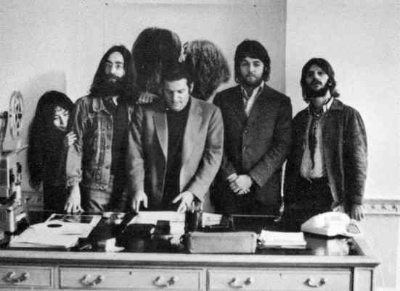Allen Klein was appointed The Beatles' business manager today after having a meeting with the Beatles and John Eastman.
His immediate task was to examine the group's finances, and find a way to stop Brian Epstein's former company NEMS, now run by his brother Clive, from taking a quarter of their earnings.
The decision to appoint Klein was seen as a fait accompli by Paul McCartney, who had wanted his future father-in-law John Eastman to represent the group. He was, however, outvoted 3-1 by the other Beatles.
In London's High Court in early 1971, during the hearing of McCartney's lawsuit to dissolve The Beatles' partnership, the following was read out as part of Allen Klein's affidavit:
"On the morning of 3rd February 1969, I went to 3 Saville Row and saw the four Beatles, John Eastman and a few principal staff members of Apple, who were informed that my company (then still called Cameo-Parkway) had been appointed to look into the affairs of The Beatles and all their Companies. At this meeting John Eastman agreed that he would, after all, act as legal adviser to The Beatles and all their companies.
Apple issued two press announcements, one relating to my Company's appointment and a separate one relating to the appointment as lawyers of John Eastman's firm, Eastman & Eastman. Cameo-Parkway also issued a press announcement of its own, a copy of which is now produced and shown to me marked "A.K.4".
On the evening of the same day, 3rd February 1969, I met Clive Epstein and Mr Pinsker at the Dorchester Hotel to discuss with them the possible purchase by Apple of the share capital of NEMS. Clive Epstein was then Managing Director of NEMS and Mr Pinsker's firm, Bryce Hammer & Co, acted as accountants for both NEMS and The Beatles. I asked Clive Epstein if he would be willing to wait and defer a decision with regard to his disposal of NEMS for about three weeks until I had had an opportunity to assess the financial position of The Beatles and their companies. Clive Epstein agreed to defer a decision for at least three weeks. The following day I left for New York to begin an investigation into the three main sources of The Beatles' income as a verification of their financial position. The three sources were United Artists Corporation, the Company which handled The Beatles' films ("United Artists"), General Artists Corporation, which handled their American tours ("G.A.C.") and EMI and its United States subsidiary, Capitol Records Inc. Formal letters of direction were issued by The Beatles to enable me to obtain the requisite information. There is now produced and shown to me marked "A.K.5" a bundle comprising copies of these letters and other letters referred to below."
Source: The Complete Beatles Chronicles - Mark Lewisohn


